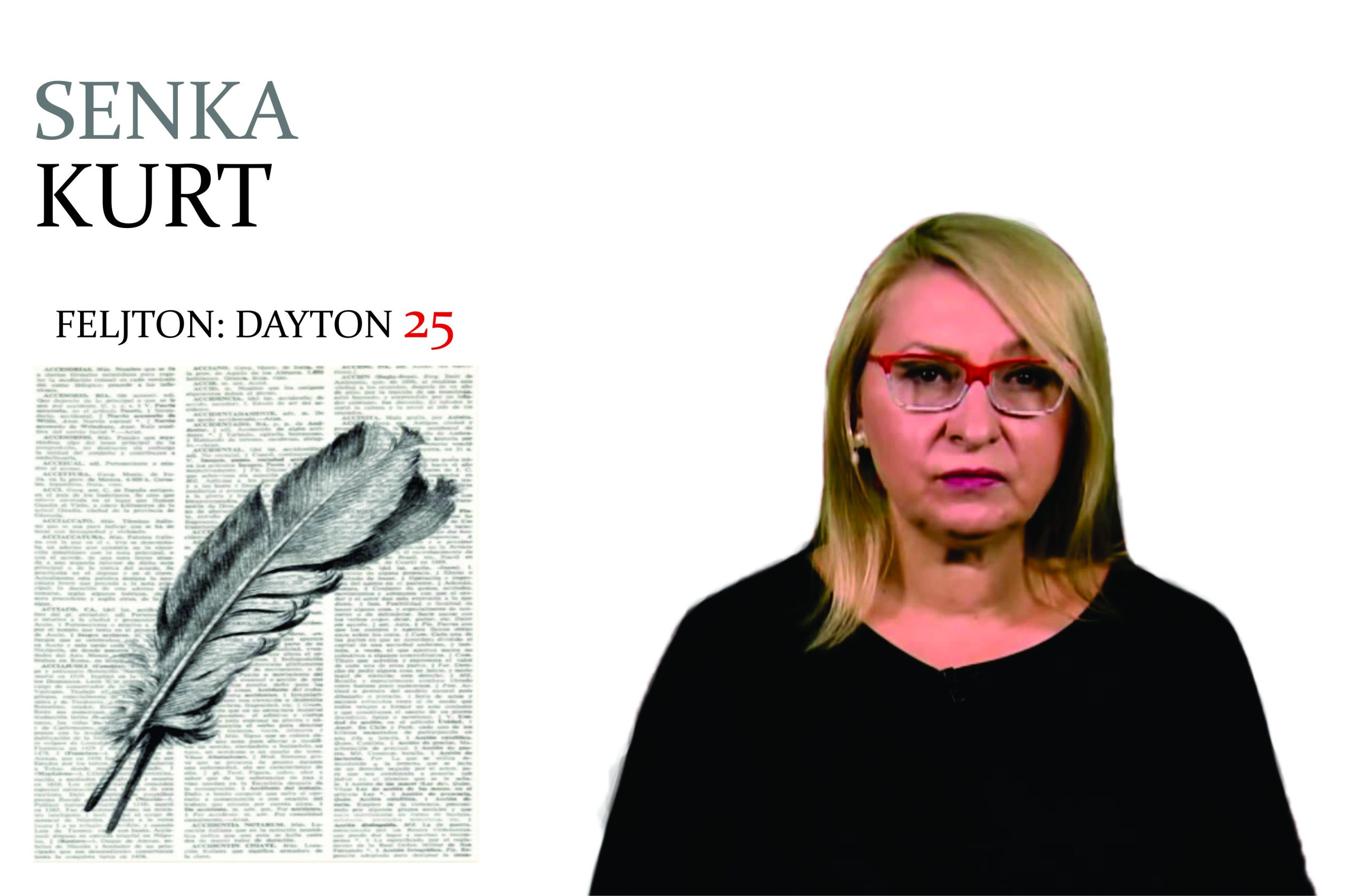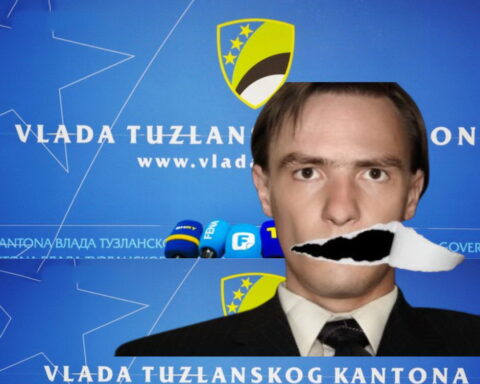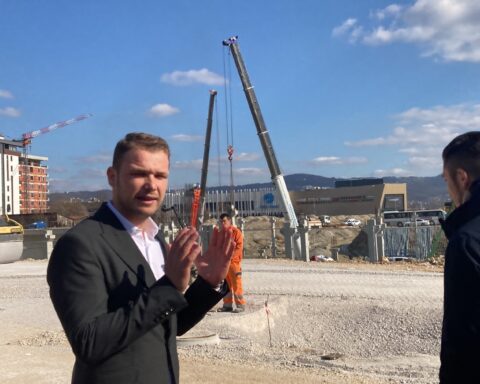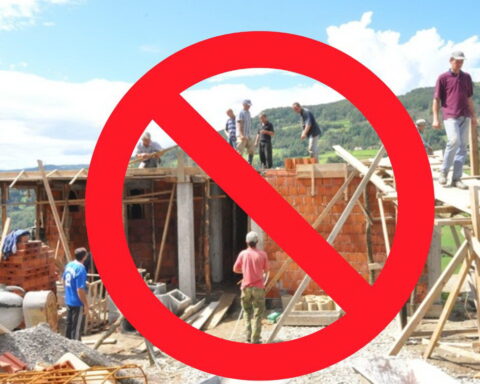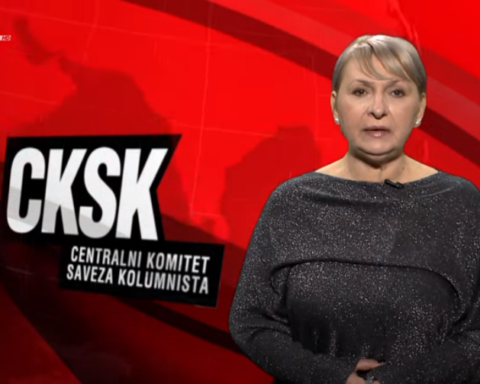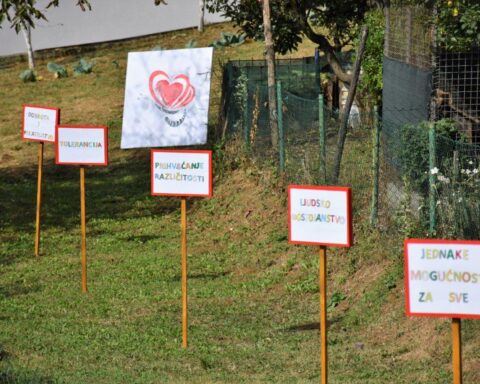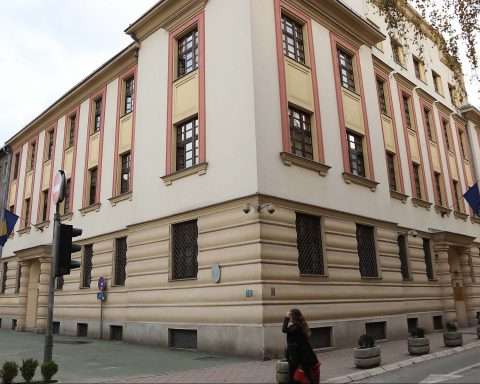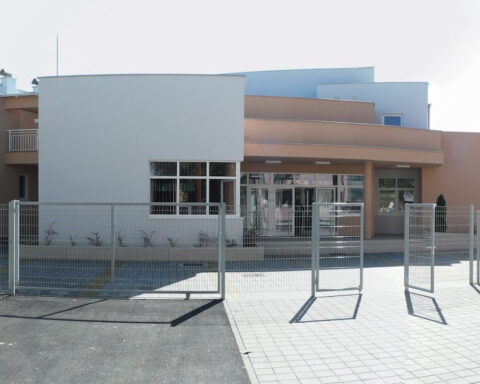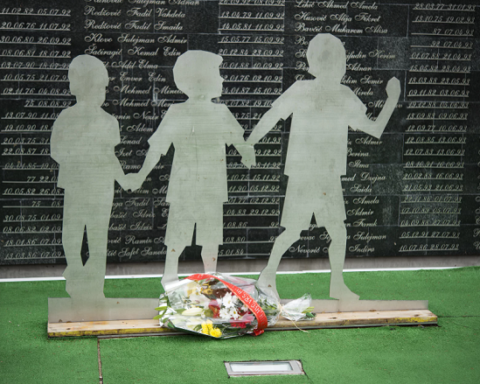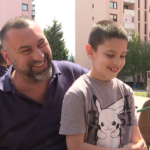While Bosnians are the kind of friends who test your patience, Milošević often openly lied about the facts or changed his position after we thought we had concluded something. As for Tuđman, he is quickly becoming the King of Dayton – the chief American negotiator later testified.
Author: Senka Kurt for Interview.ba
It is interesting, however, what is happening in the Bosnian delegation during the stressful and fateful negotiations. From the beginning, Holbrook compared the team that arrived from Sarajevo with the “mini Yugoslavia”, in constant disagreement with each other.
The former Prime Minister Haris Silajdžić, according to the assessments of the Americans, was for a time the most balanced and most ready to cooperate. However, his every attempt to initiate reasonable negotiations was undermined by either Izetbegović or Šaćirbegović.
– Silajdžić’s frustration became so intense that his emotions prevailed and made it impossible for him to make rational decisions – said Richard Holbrooke, the main American negotiator.
The Silajdžić-Izetbegović conflict culminates in negotiations
None of the three mentioned later wanted to speak openly or publicly about it. However, the fact is that the conflict between Silajdžić and Izetbegović, which arose in Dayton, continued in Sarajevo. Silajdžić quickly left the Party of Democratic Action and founded his Party for BiH.
Tired of running between delegations and resolving the question of who is more important than other, the Americans, according to the study, decided to bring the negotiations to an end. The final map was to be offered on the afternoon of November 13th. By midnight, they are running from one to the other, Bosnians are looking for parts of the territory in north-western Bosnia because of railway connections and the area south of Goražde because of power plants, and they insist on Brčko. Milosevic rejects everything. There is no progress. US President Clinton is also involved in the story with the initiative to get Congress to send US troops on a mission to implement the agreement in Bosnia and Herzegovina, and Assistant Secretary of State John Shattuck is arriving in Dayton after investigating war crimes in the Banja Luka area.
The day after didn’t bring too much news. Holbrooke writes that Bosnians are “disorganized”, Milošević is “dishonest”, Tuđman is “disinterested”.
– My concern about the situation here is based on the amount of time we lost on things like the sanctions dispute, the time spent building the Federation (although it was productive and unavoidable, it took us eight days) and, above all, big difficulties in engaging the Bosnian government in serious negotiations … So on the fourteenth day we are where we were supposed to be after 8 or 9 days – Holbrooke writes.
He states that each party questioned the prospects for an agreement in its own way:
– While Bosnians were that kind of friends who test your patience, Milošević often openly lied about the facts or changed his position after we thought we had concluded something. As for Tuđman, he is fast becoming the King of Dayton – the American negotiator concludes almost jokingly.
Krajišnik and Bosnian Serbs: Present but invisible
Warren Christopher arrives at the military base again, as a “last warning of seriousness.” Holbrook advised him to leave a clear message to Balkan negotiators that upon his return to Dayton, an agreement must either be reached or negotiations concluded.
– As Holbrooke warned, the Secretary of State found that the problem was especially acute with Bosnians. Bosnians are very divided among themselves and are not yet fully convinced that a peace agreement is in their best interests – wrote Christopher in a report to President Clinton.
After three days, Christopher leaves Dayton convinced that, whatever the outcome, the negotiations are entering the final phase. He later testified that he saw fatigue on the faces of both Balkan leaders and his associates.
Present, but invisible, is how the Bosnian Serbs are described, led by Momčilo Krajišnik, and in whose name Milošević always spoke exclusively. They are also looking for their vote, so it seems to American mediators that everything is spinning in a circle. One of the negotiators lucidly concludes, “As the weather in Dayton becomes cold and windy, the temperature in the negotiations is not getting warmer either.”
Then the proposal (of the Serbian delegation) was accepted that the Americans should stop walking from one to the other and sit together at the green table.
Although he was the head of the delegation for all Serbs, Milošević was rarely seen with them. Seeking a valve for their frustrations, Bosnian Serbs began to offer suggestions directly to the Americans that no one had asked them to … Complaining that he was excluded from the process, Krajišnik said he wondered if there was any use in any remark when the method of work which was adopted by international mediators, needless to say, is seriously threatening to undermine overall Dayton peace efforts – stated in the Study.
Along with diplomacy, American politics are working rapidly. In Washington, the Committee of Representatives of State Agencies Represented in the National Security Council discussed progress in Dayton, but also the possibility of implementing the expected agreement. The conclusion is that the United States will coordinate the program of equipping and training Bosnian forces, but will act behind the scenes, while weapons will be provided by others. As for sanctions against Serbia, the United States will advocate in the Security Council that they be suspended after the agreements are signed, ie completely lifted when the agreement is implemented. Similarly, the arms embargo will be lifted in stages.
Who was “like a panther in a cage”
In Dayton there are waiting for Warren Christopher arrival, and in the meantime, as it seems, the negotiations are coming to an end, the Balkan leaders and the hosts are being visited by the highest American officials, NATO commanders. An informal meeting between Milošević and Silajdžić was held during the day because Holbrooke hoped Silajdzic could be “the key to the solution”.
The Americans were worried that the inter-Bosnian conflict was causing severe psychological pressure on Silajdžić, whom the US ambassador to Bosnia and Herzegovina, John Menzies, noticed had as much nervous energy “like a panther in a cage.” As he was increasingly repressed by Izetbegović and Sacirbey, Silajdžić became more and more depressed and fatalistic until his occasional “disappearance from the negotiations” – it is stated in the Study.
However, Holbrook sees Silajdžić as “the most reasonable member of the BiH delegation”, asking his associates to spend more time with him, talk about his family, about how he sees the future. Thus, they brought him “by surprise” to the Officers’ Club, where Milošević was resting, and a conversation about the status of Goražde began.
A member of the BH delegation, the former member of the President’s office, dr. Ivo Komšić also wrote about it in his diary notes.
– There was a long discussion about the solution of Goražde. The weight of these negotiations, as well as around Sarajevo, was borne by Silajdžić. He talked for hours with Milosevic. There are interesting stories, even anecdotes. We had a minimal variant for Goražde which included the river Drina from Goražde to Ustikolina. Silajdžić insisted on Ustikolina, and the goal was the flow of the Drina in the length of 20 kilometers. In the end, Milošević asked him:
– Haris, you are so stuck for that Ustikolina, so it is a backwater town in which there is nothing.
– It has the oldest mosque in BiH -Silajdžić answered.
– There is no mosque because those thugs of ours demolished it.
– There is a ground on which the mosque was, It is for us Muslims a sacred ground on which we will build a mosque again.
– Haris, I thought you were a civilized man. You’re telling me about the holy ground. You are the same as Karadžić he constantly tells me about the sacred Serbian ground -Milošević answered.
The Study also claims that this conversation served to “melt the ice” between Milošević and Silajdžić.
Milošević, with charm in full swing, at one point told to Silajdžić that, after enduring three years under shelling ‘Bosnian Serb cowards’, the Muslim government’ deserved ‘Sarajevo’ – it was stated.
Milošević offers the “whiskey way”
That evening, Holbrooke called on Milošević to definitely agree on Goražde. With a bottle of whiskey, the Serbian president accepted Corridor. It was strange to us in Sarajevo why this road is called the “whiskey way”. When information leaks from Dayton, much will be clearer.
On November 17, a high-ranking U.S. military delegation led by Secretary of Defense William Perry arrives at the base. Their goal is to convince the three presidents that they are serious in their promises and increase the pressure to reach an agreement. A reminder written by Perry ahead of the Izetbegović – Milošević meeting read: “If there is no agreement, it would be a problem for the United States, but it would also be a disaster for your country.”
– I told them that I believe and that our government believes that the imbalance of forces in 1992 contributed to the war starting in the first place. Therefore, when NATO forces leave in a year, we do not want to leave an imbalance … we will work with them to restore the balance of forces – said Perry in an interview with the BBC on January 18, 1996.
In a worrying remark, Izetbegović said he could not be part of an agreement signed with Bosnian Serbs. As was the case with the Nazis, he said, the agreement should be imposed on them. Responding, Perry said bluntly that, unlike Allied forces in World War II, the Bosnians did not defeat the Bosnian Serb army militarily.
While visits by senior officials from Washington lasted until that evening, November 17, work was completed on five of the 11 annexes to the agreement: on human rights, refugees, national monuments, civilian implementation, and the police. But the most contentious issues remain – the constitution, elections, and the map. The issue of the constitution was addressed by Roberts Owen, who claimed that “the document contained more than he initially expected, but not enough to guarantee an effective central government”.
The Bosnian and Serbian sides have had a heated dispute over refugee voting rights and the OSCE’s role in monitoring elections. Milošević insisted that refugees must be present at the elections in person, and the Bosnian side insisted that they could register and vote where they lived at the time of the 1991 census. So the Americans offered a compromise – let the refugees choose where they want to vote.
Everyone was slowly losing patience. The Americans had hoped everything would be resolved by the end of the weekend to get home on Thanksgiving. That’s why Saturday was supposed to be a decisive day.
And it was the day that came that brought an unexpected concession – Milošević wanted to talk about a united Sarajevo. Komšić remembers talking about that with Krešimir Zubak.
– We have been discussing this for a long time and trying to find the ultimate intention of this act. In the end, the only real reason for that could be the idea of a final division – Komšić wrote.
Menzies’ list of winnings for BiH side
He records how Warren Christopher arrived in Dayton again and how he “climbed” from one delegation to another. But it was as if it was clear to everyone that the negotiations must be completed – with success or failure. That is what they told Izetbegović and Milošević. The deadline is Sunday at midnight.
It was Friday before the weekend when from the BH delegation a threat was sent that they will not sign the constitution for “political reasons”. It got stuck on who will sign that document, who will be elected as the chairman of the Presidency of BiH, and who will be the head of the Parliament. The rotation was not an option.
Then the task was given to Ambassador John Menzies. He had to make a “list of winnings” for the BH. side in what has mostly already been agreed. The list had eight items: 1. a state government with a democratic constitution and common institutions; 2. economic recovery package; 3. NATO forces to implement the agreement under US command; 4. significantly strengthened Federation; 5. territorial gains from 50 percent before to 55 percent after negotiations; 6. broad civilian police structure; 7. additional protection of human rights; 8. Belgrade’s commitment to the normalization of relations, including measures to further strengthen trust.
Alija Izetbegović also received two important phone calls – from the British Prime Minister John Major, from the Turkish President Sulejman Demirel.
So the suitcases were unpacked again. Holbrooke and Christopher were convinced that negotiations would conclude at midnight Sunday, told U.S. officials to pack up. But too early.
Milošević’s concessions in the previous days, regarding the Goražde corridor and the united Sarajevo, were unexpectedly called into question when he came to the meeting in Izetbegovic’s apartment behind the couch and saw the top of a poster made by the American team as a visual illustration of Bosnian gains.
The study describes how Silajdžić and Milošević, mediated by Chris Hill, sat over the map and exchanged settlements that had only symbolic value. At two o’clock after midnight, new maps arrived. The Serbs were offered some more territory, and then suddenly – at 4 in the morning, they announced the agreement and shook hands.
Izetbegović was brought from the bed, in his pajamas
According to the study, Silajdžić went to wake up and bring Izetbegović, who came in a coat over his pajamas, and Hill went to pick up Tuđman and brought Croatian Foreign Minister Mato Granić, “because Tuđman was asleep”. When he saw the maps, Granić blazed and stated that the maps would not be accepted because the Serbs had already been given the space they had already conquered. Izetbegović also said that he could not oppose “his Croatian allies”. And so the agreement lasted only 37 minutes.
In the end, Clinton called Tuđman.
– I am calling you to ask for a smaller percentage of territory that is not traditionally Croatian to return the map to a ratio of 51 to 49 percent – this conversation remained recorded.
U.S. negotiators, however, have already worked extensively on two versions of the final statement on the Dayton talks. One proclaimed success, the other a failure.
Just in case, they left Izetbegović, Silajdžić, and Sacirbey one hour in the evening to decide whether to accept or reject the agreement. The answer arrived in an hour and a half, sometime around 22:30, Sacirbey announced that the agreement was accepted on the condition that the Bosnian side gets Brčko. That is how the statement of failure arrived, so it was handed over to the Bosnian side to both Milošević and Tuđman.
Witnesses say Milošević was very disappointed.
The new day was not promising. It was snowing in Dayton. It was on November 21st. Milošević took matters into his own hands, headed towards Tuđman with a proposal that the two of them sign the agreement.
Holbrook’s wife, Katie Marton, broke into the meeting of the American team, which started at eight in the morning, and said that she saw Milošević in the parking lot, waiting only in a shirt, without a coat. He sought a meeting with Christopher and Holbrook. That proposal was rejected, so the negotiators went to Izetbegović’s apartment and presented him with the last offer. Everything that has been agreed will be fulfilled, except for Brčko, which will be the subject of arbitration. Otherwise, the end of the negotiations will be announced in less than two hours. There will be no new deadline.
– After a long pause, Izetbegović said ‘this is an unjust peace’, and then, as if saying the words by force, he said: ‘But my people need peace’. The Bosnians agreed. Holbrooke, knowing that things could go sideways quickly if he and Christopher stayed to discuss the details, whispered to the Secretary of State: ‘Let’s get out of here quickly,’ “it said.
Click, clack, on a typewriter
An invitation to the White House soon followed, and President Clinton was to announce the success of the negotiations in the Garden of Roses.
That’s how it was. At 11:40. from the Rose Garden Clinton said: – After almost four years and 250,000 killed, two million refugees and atrocities that stunned people around the world, the people of Bosnia finally have the opportunity to turn to the promise of peace from the horrors of war.
Ivo Komšić wrote in his diary.
– When I got up around 9.30 in the morning, I saw people from the American security service in the hallway. From this, I knew that Christopher was with Izetbegović. He came out soon after. I ran into Izetbegović and asked him what he wanted now. He replied that the agreement had been accepted. I was shocked by that twist. Some of our experts congratulated each other in the hallway, some kissed. Understandably, they were most exhausted by this, they took the big deal off the door. I couldn’t say anything. I didn’t feel anything, like this was happening to someone else. How did this end come about? Since the conference disintegrated for the corridor and Brčko because Milošević was persistent in the request for enlargement, and we persistently refused, Granić came up with a compromise, they say. He proposed arbitration for that problem by the international commission. Milošević refused even that until the morning and then relented. That’s how the conference was saved, and that’s how we got the Dayton Accords.
Amira Kapetanović was the official translator of the BH. delegation. Later, she was the BH ambassador to Hungary, Austria, Australia … almost never, even at the insistence, she didn’t talked about what she heard, saw, or experienced during those almost three weeks at the military base in Dayton. Once, however, she told an anecdote to a few of us.
– So, I just got back from the pool. I’m in a tracksuit, I’m wearing sports socks. They knock on the door and say that I should immediately go to one of the rooms and translate. I had to retype that material later. And now the era of computers is well advanced, and we are from the war. What computers, who even knows how to use them. And I’m looking for a typewriter and indigo paper, to make a few copies. Everyone looks at each other, where the machine is from, where that paper comes from. But they found it. And I typed. Afterward, everyone said that the Bosnian delegation was too cautious. That we don’t want to type material so that it doesn’t stay on the computer, but we do it on a typewriter so that no trace of our agreements remains. And we were all silent, who would admit that we do not know how to use a computer – said Mrs. Kapetanović.
This can be an illustration of the situation with which BH delegation is leaving, exhausted, tired, full of dilemmas, devastated from within by vanity, ego, dragging from one side to the other.
However, it was not easier for the Serbian delegation either, to which Milošević presented the map just before the signing. Until that moment, Krajišnik’s team did not even know that Milošević had surrendered Sarajevo.
– When Krajišnik saw the map – and the fact that not only Sarajevo was lost but also his favorite villa in western Bosnia – he fainted. Asked what happened, Milošević said: “He fell into a coma.” According to all information, Bosnian Serbs were horrified by what Milošević did – Chollet and Freeman write.
Thus, Bosnia and Herzegovina set out to meet the new year of 1996 in peace.
Izetbegović, Milošević, and Tuđman still had a trip to Paris, where it was agreed that the Dayton Agreement would be initialed on December 14. Here, Milošević will answer the dilemma that Pećanin and I had – what is the state system of BiH after Dayton. Namely, Milošević said the notion of BiH – “Republika Srpska and Muslim-Croat Federation”. Since Milošević did not mention Bosnia and Herzegovina, Tuđman did not mention the confederation of Croatia and Bosnia and Herzegovina, but “the friendly relationship between the Bosniak-Croat federation and Croatia,” and Izetbegović did not allow himself the most conventional clapping of his hands after their speeches.
And where is the Agreement?
A painful chance for peace, stated the BH. media, describing the events in Paris, but we have missed so many painful chances to this day that we no longer remember all the wounds inflicted on us despite Dayton in the past 25 years.
However, the time immediately after the signing of the Agreement remains in the memory. First, the reintegration of the city. I remember our entry into Grbavica. We stand on the former bridge Bratstva-jedinstva, we hold the hands of a few of us and weep. Let’s go find our pre-war proofreader, the great Mrs. Maya.
We cross slowly and as if entering another dimension. Grbavica burns in the remains of garbage, pieces of furniture scattered on the streets, ceramic tiles from ruined bathrooms, here and there a table and a chair.
After that, a sleepless day of crossing the Igman. Ilidža was not “in Sarajevo” yet, so we went over the mountain, in March we were going to “bring Hadžići back”. Terrible testimonies and stories.
Then, day by day we realized that Dayton didn’t bring everyone the same. He put us Bosnians, for example, outside the Constitution. It is not that I desperately want to be a member of the Presidency of BiH, but I would like the Constitution of the country where I was born and where I will probably die, allowed me to be as important as a Bosnian, in the same way, Serbs, Croats, and Bosniaks of my BiH are important.
As in the Epitaph about the soldier Grigor Vitez, I think that Dayton could have come earlier. Before the Gate, before Srebrenica, before all the horrible crimes, logs, mass murders, graves that are still being excavated today.
If he had arrived just the day before … many of them would have survived.
Big anniversaries need big celebrations, but even if it wasn’t pandemic time, I don’t know what we would have to celebrate. Peace? Which, I tell you, is the most valuable of all. But the peace in which we have felt unrest almost every day since November 21, 1995, is not to be celebrated. Already to reconsider whether we could have done otherwise. And we certainly deserved it.
At the beginning of 2008, the former Chairman of the Presidency of BiH, Željko Komšić, warned his colleagues that the original copy of the Dayton Agreement had disappeared from the archives of the Presidency. It was known that Izetbegović personally brought the original Dayton after returning from the USA, and years later no one knew where the historical document ended up.
It will soon be known that Serbia does not have the original either, so the situation, as they explained from Belgrade, is being saved by the French, who keep their copy and send certified copies every year when someone asks them to do so from Serbia. In Croatia, they claim, they have the original. And it cannot happen that they lose such an important document.
And the essence of the agreement, when we look a little closer, is lost to all. They do not know where he is nor from where to begin. Maybe from a new beginning?! From some new Dayton?
Also read:
- FEATURE: Dayton, 25 years later (I) – Everything is fine, it’s just unclear where everything is going
- FELJTON: Dayton, 25 godina poslije (I) – Sve u redu samo je nejasno kuda sve ide
- FELJTON: Dayton 25 godina poslije (II) Holbrooke: Bosanci su neorganizirani, Milošević nepošten, Tuđman nezainteresiran
(Interview.ba)

